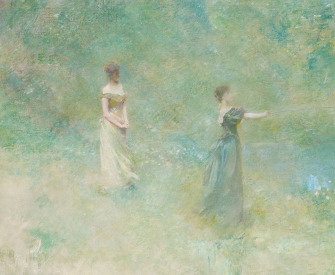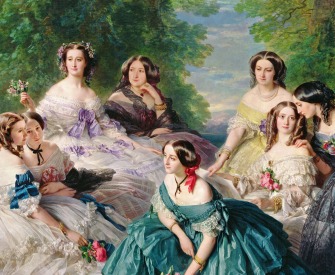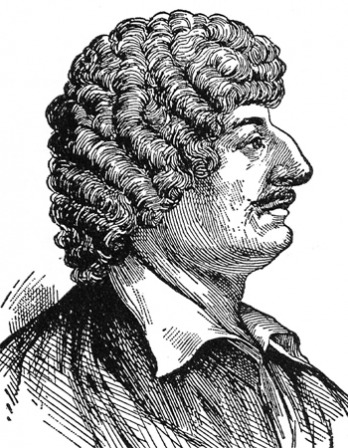Education is what survives when what has been learned has been forgotten.
—B.F. Skinner, 1964Book Club
Samuel Richardson proposes a homeschooling experiment.
From Mrs. B. to Lady Davers
My Dear Lady,
Mr. B. has just put into my hands Mr. Locke’s treatise on education, and he commands me to give him my thoughts upon it in writing. He has a very high regard for this author and tells me that my tenderness for Billy will make me think some of the first advice given in it a little harsh; but although he has not read it through, having only dipped into it here and there, he believes from the name of the author that I cannot have a better directory; and my opinion of it, after I have well considered it, will inform him, he says, of my own capacity and prudence, and how far he may rely upon both in the point of a first education.
I asked, if I might not be excused writing, only making my observations, here and there, to himself, as I found occasion? But he said, “You will yourself, my dear, better consider the subject and be more a mistress of it, and I shall the better attend to your reasonings when put into writing; and surely, Pamela, you may, in such an important point as this, as well oblige me with a little of your penmanship, as your other dear friends.”
After this, your ladyship will judge I had not another word to say. He cuts one to the heart when he speaks so seriously.
I have looked a little into it. It is a book quite accommodated to my case, being written to a gentleman, the author’s friend, for the regulation of his conduct toward his children. But how shall I do if in such a famed and renowned author I see already some few things which I think want clearing up? Won’t it look like intolerable vanity in me to find fault with such a genius as Mr. Locke?
I must on this occasion give your ladyship the particulars of a short conversation between your brother and me, which, however, perhaps, will not be to my advantage, because it will show you what a teasing body I can be if I am indulged. But Mr. B. will not spoil me neither in that way, I dare say! Your ladyship will see this in the very dialogue I shall give you.
Thus it was. I had been reading in Mr. Locke’s book, and Mr. B. asked me how I liked it?
“Exceedingly well, sir. But I have a proposal to make, which, if you will be pleased to comply with it, will give me a charming opportunity of understanding Mr. Locke.”
“What is your proposal, my dear? I see it is some very particular one, by that sweet earnestness in your look.”
“Why, so it is, sir; and I must know whether you are in high good humor before I make it. I think you look grave upon me, and my proposal will not then do, I’m sure.”
“You have all the amusing ways of your sex, my dear Pamela. But tell me what you would say? You know I don’t love suspense.”
“Maybe you’re busy, sir. Perhaps I break in upon you. I believe you were going into your closet.”
“True woman! How you love to put one upon the tenters! Yet my life for yours, by your parade, what I just now thought important is some pretty trifle! Speak it at once, or I’ll be angry with you,” and tapped my cheek.
“Well, I wish I had not come just now! I see you are not in a good humor enough for my proposal. So, pray, sir, excuse me till tomorrow.”

Girls jumping rope at the Chuxi village primary school, Fujian, 2014. Photograph by Michael Yamashita. © Michael Yamashita / GEO Image Collection / Art Resource, NY.
He took my hand and led me to his closet, calling me his pretty impertinent; and then urging me, I said, “You know, sir, I have not been used to the company of children. Your dear Billy will not make me fit, for a long time, to judge of any part of education. I can learn of the charming boy nothing but the baby conduct: but now, if I might take into the house some little master of three or four years old, or miss of five or six, I should watch over all their little ways; and now reading a chapter in the child, and now one in the book, I can look forward, and with advantage, into the subject, and go through all the parts of education tolerably, for one of my capacity; for, sir, I can, by my own defects, and what I have wished to mend, know how to judge of and supply that part of life which carries a child up to eleven or twelve years of age, which was mine, when my lady took me.”
“A pretty thought, Pamela! But tell me, who will part with their child, think you? Would you, if it were your case, although ever so well assured of the advantages your little one would reap by it? For don’t you consider that the child ought to be wholly subjected to your authority? That its father or mother ought seldom to see it, because it should think itself absolutely dependent upon you? And where, my dear, will you meet with parents so resigned? Besides, one would have the child descended of genteel parents, and not such as could do nothing for it; otherwise the turn of mind and education you would give it might do it more harm than good.”
“All this, sir, is very true. But have you no other objection if one could find a genteely descended young master? And would you join to persuade his papa to give me up his power only from three months to three months, as I liked, and the child liked, and as the papa approved of my proceedings?”
“This is so reasonable, with these last conditions, Pamela, that I should be pleased with your notion if it could be put into practice, because the child would be benefited by your instruction, and you would be improved in an art, which I could wish to see you an adept in.”
“But perhaps, sir, you had rather it were a girl than a boy?”
“I had, my dear, if a girl could be found whose parents would give her up to you; but I suppose you have some boy in your head, by your putting it upon that sex at first.”
“Let me see, sir, you say you are in a good humor! Let me see if you be”—looking boldly in his face.
“What now,” with some little impatience, “would the pretty fool be at?”
“Only, sir, that you have nothing to do but to speak the word, and there is a child whose papa and mama, too, I am sure, would consent to give up to me for my own instruction, as well as for her sake; and if, to speak in the scripture phrase, I have found grace in your sight, kind sir, speak this word to the dear child’s papa.”
“And have you thus come over me, Pamela! Go, I am half-angry with you for leading me on in this manner against myself. This looks so artful that I won’t love you!”
“Dear sir!”
“And dear madam, too! Begone, I say! You have surprised me by art, when your talent is nature, and you should keep to that!”

Samuel Richardson
From Pamela. Around the age of thirteen, Richardson was employed by his female friends to ghostwrite their love letters. In 1741, nearly forty years later, having established a successful London printing business, he published Letters Written to and for Particular Friends, an epistolographic manual featuring the correspondence of fictional characters; several of the letters anticipate the plot of Pamela, which he began drafting around the same time. He was, writes one biographer, “not one of those who make genius an excuse for idleness.”



